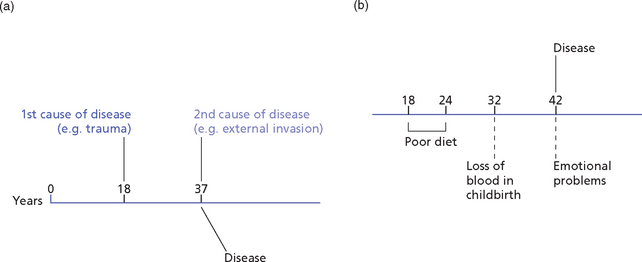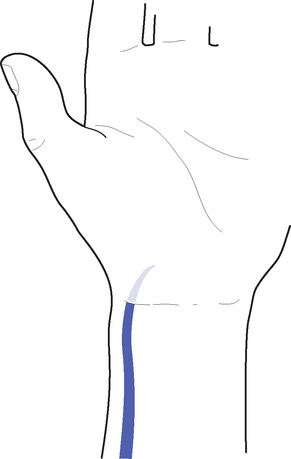Chapter 48 Traditionally the causes of disease were differentiated according to three broad categories: external (due to climate), internal (due to emotions), and miscellaneous. Nowadays, this classification is no longer relevant (not least because some of the most important causes of disease are in the ‘miscellaneous’ group) and we need not follow it. The main causes of disease, listed in approximate order of their importance and frequency are: I find that, when identifying a cause or causes of disease, it is helpful to divide a person’s life into five distinct ages (see below). Because each cause of disease is more prevalent during a certain period of life, establishing when the cause arose helps us to identify the disease. There seldom is only one cause of disease; nearly always a disease results from the combination of at least two causes. Usually one cause occurs at a certain point of the patient’s life, then, some years later, another cause intervenes and the combination of the two triggers a disharmony (Fig. 48.1). Some examples will be given below. A girl suffers deep emotional traumas around the time of puberty, owing to family conflicts. These have no apparent effect until she is an older woman. At the age of 27 she is working very hard and for very long hours; the emotional problems at puberty (which affect the Directing and Penetrating vessels) interact with the overwork later in life to cause gynaecological problems, possibly endometriosis. The patient’s life can be differentiated into five stages: Leaving home often coincides with a deterioration in the young person’s dietary habits characterized by irregular meals, eating ‘fast foods’, and often becoming vegetarian. When practised without a proper understanding of nutrition, a vegetarian diet may lead to Blood deficiency, especially in girls. Therefore, digestive problems later in life often have their root in the early 20s. The constitutional body condition inherited from our parents depends on three factors: Manifestations of this constitution include a white complexion, fear, shyness, proneness to colds, whooping cough, asthma and eczema, a thin chest, a ‘special’ Lung pulse (Fig. 48.2) and Lung cracks on tongue. In pregnancy, this constitution may be caused by the mother’s suffering a shock. Manifestations of this constitution include myopia or headaches from an early age; the child may be very tense with a sinewy body, nocturnal enuresis, restless sleep, twitching in sleep, screaming during sleep, feeding a lot as a baby, hungry as a child, short-tempered, a Wiry pulse and a Red tongue with coating. In pregnancy, this constitution may be caused by the mother’s emotional stress and anger. The ‘Spiritual Axis’ in Chapter 8 clearly illustrates the reciprocal relationship between the emotions and the Internal Organs. It says: ‘The Heart’s fear, anxiety and pensiveness injure the Mind … the Spleen’s worry injures the Intellect … the Liver’s sadness and shock injure the Ethereal Soul … the Lung’s excessive joy injures the Corporeal Soul … the Kidney’s anger injures the Will-Power…’.1 On the other hand, further on it says: ‘If Liver-Blood is deficient there is fear, if it is in excess there is anger … if Heart-Qi is deficient there is sadness, if it is in excess there is manic behaviour …’2 The emotions taken into consideration in Chinese medicine have varied over the years. From a Five-Element perspective, the ‘Yellow Emperor’s Classic’3 considered five emotions, each one affecting a specific Yin organ: However, these are not by any means the only emotions discussed in the ‘Yellow Emperor’s Classic’. In other passages sadness and shock are added, giving seven emotions: Other doctors considered other emotions such as grief, love, hatred and desire (craving). Thus, the list of emotions could be expanded as follows:
 DIAGNOSING THE CAUSES OF DISEASE
DIAGNOSING THE CAUSES OF DISEASE
INTRODUCTION
INTERACTIONS BETWEEN CAUSES OF DISEASE
Interaction of emotional problems at puberty and overwork
THE FIVE STAGES OF LIFE
Young adulthood
THE CAUSES OF DISEASE
Heredity
Weak-Lung constitution
Weak-Heart constitution
Weak-Liver constitution
Emotions
DIAGNOSING THE CAUSES OF DISEASE





